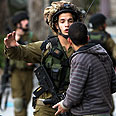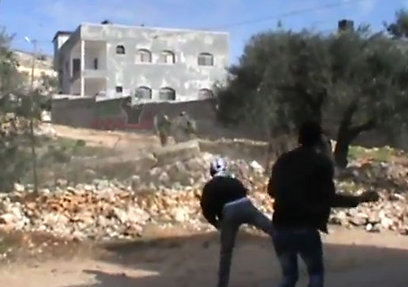
IDF defends restraint policy
Senior military source says restraint policy pertaining to rules of engagement in West Bank proved effective in preventing further violence. 'We can't fire at every stone-thrower. We don't want to hurt noncombatants,' he says
The IDF is defending the policy advocating restrained rules of engagement in cases of West Bank riots, following criticism in the wake of two incidents that saw soldiers fleeing scenes of conflict.
"This policy has resulted in safer routes and very few casualties," a senior officer at the Judea and Samaria Brigade said.
Related stories:
- Soldiers: Our hands are being tied
- Watch: Palestinians stone IDF soldiers
- Palestinian officer punches soldier in Hebron
"Had we fired indiscriminately during the many protests surrounding Operation Pillar of Defense and shot at every 13-year-old stone thrower, then we would have seen the operation spill over to the West Bank," he added.
Meanwhile, the IDF continues to investigate the Hebron and Kafr Qaddum incidents, in which soldiers were filmed retreating as Palestinians pelted them with stones.

The incident at Kafr Qaddum
An initial inquiry into the Kafr Qaddum incident suggests that the soldiers failed to follow protocol by escaping and should have used crowd-control measures instead.
The source stressed that the two incidents were isolated events and that most of the cases that led to internal inquiries in the past few years were of soldiers who decided to open fire, mostly justifiably.
He further added that the IDF has updated the guidelines fiven to company commanders and divided them to an array of possible scenarios.
_Wa.jpg)
Clashes in Jerusalem
The longest standing order that has not changed in the past decade is still valid: In clear cases of life threatening situations, a soldier must decide himself whether to open fire at the suspect or fire warning shots.
"We had many cases, including in the past month, where soldiers opened fire at protesters who put their lives at risk and did the right thing," the officer said.
Referring to the last two incidents he said, "The soldiers had the option of opening fire but felt they should not and in the Hebron case they did the right thing; they succeeded in preventing the hurling of stones at an Israeli community and no soldier was hurt."
The officer explained that the policy of restraint has proven itself in that it has prevented retaliatory terrorist attacks and violent protests.
"All fire orders are based on the purity of arms. It is our duty to act proportionately and fire a weapon only as the last resort. We do not want to hurt noncombatants and fire indiscriminately."
He revealed that fire orders are constantly being reviewed and that the IDF is considering the introduction of new crowd-dispersal means such as stun guns and special sponge bullets. The use of rubber bullets for example is only permitted upon the battalion commander's approval as they can be fatal if shot from a close range.
The military source further revealed that the IDF's fire orders do not distinguish between Jewish or Palestinian assailants. "In any case, it is always preferable to avoid firing whenever it is possible."
- Receive Ynetnews updates directly to your desktop










